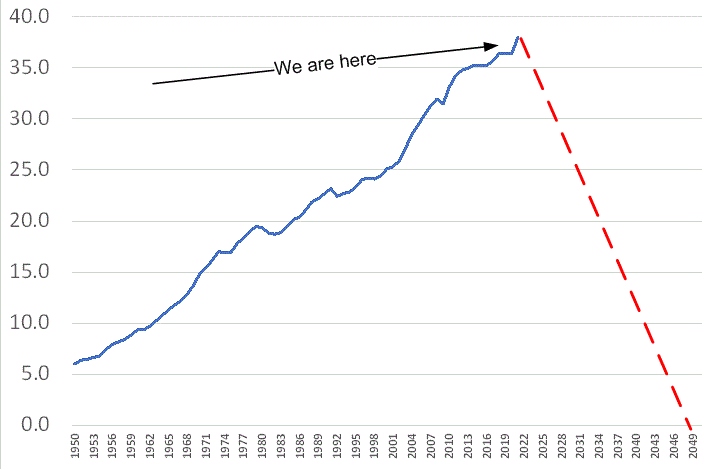Who Will Respond?

This blog is taken from the post Who Will Respond?
There are many publications that describe the predicaments in which we find ourselves. But few of these publications provide credible, realistic suggestions as to how to respond. Climate reports often make suggestions that sound good but that would be difficult to implement. For example, one activist group calls for making public transport free and removing the profit motive from public transport. Fair enough, but nothing is really free — in this case someone has to pay for the public transport system. Who will that be, and will they accept that decision? On a broader scale, there are those who call for an almost immediate cessation in our use of fossil fuels. They evidently do not recognize that such an action would crash the world’s economies and lead to horrifying levels of hardship.
Climate publications often conclude with statements on the lines of, “They/We need to take action” — without defining who “They or We” might be. “They” are often found in one or more of the following groups: Governments, Business and Industry, Small Groups and Individuals. A holistic response involves all of these groups, and individuals will typically work in all of them at one time or another. In this book we will, however, focus on the second of these groups: Business and Industry.
The failure to provide specific responses was illustrated by the words of Greta Thunberg, the world’s best-known climate activist, at the COP26 meeting in November 2021. When she was an under-sized 15-year old, she courageously made headlines with her one-person protest in front of the Swedish Parliament. Her actions rightly led to world-wide fame and praise. But now she is a young adult. At COP26 she accused the world leaders of “blah, blah, blah”. She has tremendous international influence; it would be very beneficial if she herself could move from just criticizing others to developing realistic responses.
Governments
When confronted with the enormity of climate change, resource depletion and all the other ills described in books such as this, the typical reaction is to say that “the government” should “do something”. The word “government” normally refers to national governments, but it also includes international organizations (such as the Conference of the Parties or COPs, described in Chapter 2) and smaller entities, such as State and Provincial governments.
In practice, governments at all levels have achieved very little. For example, national leaders have been meeting at COPs on an annual basis for a generation, yet very little has been achieved. (At the most recent meeting, COP26 in Glasgow, the leaders of Russia, China and Brazil didn’t even bother to show up, and the Indian delegation talked about doing something 70 years from now, which functionally the same as not showing up.)
The lack of success at the government level is demonstrated in the sketch. It shows emissions of carbon dioxide (CO2) in billions of tons per annum, starting in the year 1950.

The chart shows a remarkably steady growth in the in the rate at which society has been emitting carbon dioxide over the course of the last 70 years. The rate was about 6 gigatons per annum in 1950; it is now close to 40 gigatons.
The reluctance of national leaders to take meaningful action can be seen by inspection of the dashed red line, which shows the amount by which CO2 emissions need to be reduced over the course of the next 30 years to achieve Net Zero. If a national leader were to reduce his country’s emissions at the rate shown, it would crash the economy (and probably result in that leader looking for alternative employment).
Individuals / Small Groups
Many individuals and small groups are leading by example. Frequently, these people aim to live a self-sufficient lifestyle — one in which they live off the land, and where they share resources within their local communities. They are not only providing an example to the rest of society; they are also developing techniques and skills that will be needed by others if conditions deteriorate.
The example that these individuals and small groups provide is invaluable, but their actions are not likely to have a global impact within just three decades.
Business and Industry
The idea that business and industry can help society move toward a Net Zero emissions goal seems, at first glance, to be a rather surprising statement. Industrial companies, particularly oil companies, are routinely pilloried by environmental activists for creating many of our environmental and climate change woes. These companies, it is felt, pursue the profit motive regardless of their impact on the environment. The title of a post at the resilience web site — How Big Oil Rigs the System to Keep Winning — is representative of this way of thinking. Any effort that these companies make to do with climate change is branded as being “greenwashing”.
But it is important to understand that these companies produce products used by everyone. They refine gasoline and diesel in order to meet the need that we all have to move from place to place; they manufacture plastics and medical supplies because we all want a comfortable and healthy life. If these companies stop their activities the world’s economies will crash.
Industry leadership is already happening; it is not just a possibility. While governments and international organizations talk and dither, companies see the writing on the wall. They see both an opportunity and a threat. They are not just talking, they are acting.
Critics of these companies conflate the words ‘profit’ and ‘environmental degradation’. It is taken for granted that a company can only make a profit by depleting the Earth’s finite resources, polluting the atmosphere and destroying the biosphere. One of the themes of this book is that it may be possible for companies to make a profit and also to act responsibly with regard to the natural world. Indeed, this is already happening. The leaders of these companies are not developing and implementing Net Zero programs because they want to “do good”, they are doing so because they perceive a commercial opportunity and because they want to avoid their own ‘Kodak Moment’.
Industrial companies can provide more than general leadership. Many of them have the management systems and people that will be much needed in a future world. For example, large oil companies are skilled at managing high-risk mega-projects. They may spend hundreds of millions of dollars looking for new sources of oil hoping to strike it rich, but recognizing that the prospect may turn out to be a dry hole. Management and technical skills of this type will be in high demand if society at large decides to transform its industrial infrastructure in just a few short decades.
As businesses develop technologies and strategies for a new world, they will need to redefine the term ‘profit motive’. No longer will it be enough to make a financial profit while meeting the environmental rules. In a post-fossil fuel world, companies and industries will need to see themselves as living within the biosphere, not outside it.
